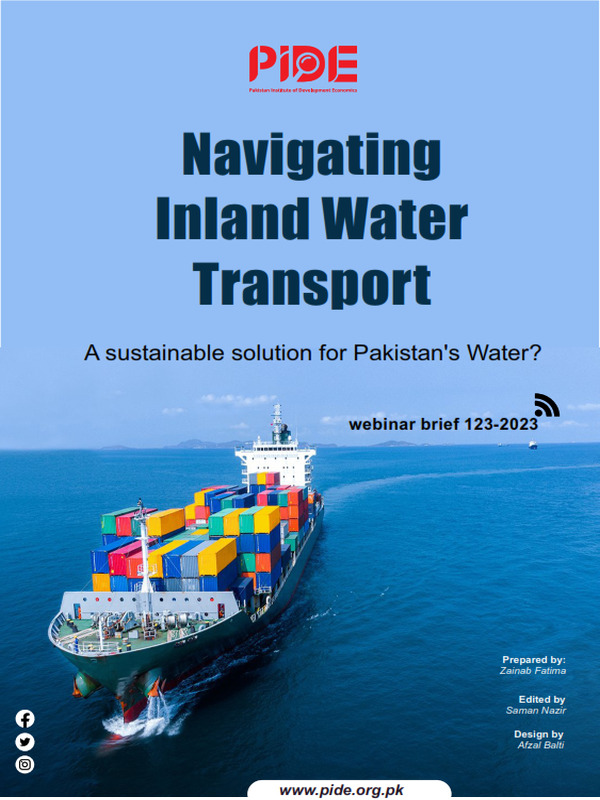
Pakistan Institute of Development Economics
- Home
Our Portals
MenuMenuMenuMenuMenuMenuMenu - ResearchMenuMenuMenuMenuMenuMenuMenu
- Discourse
- The PDR
- Our Researchers
- Academics
- Degree Verification
- Thesis Portal
- Our Portals
Navigating Inland Water Transport: A Sustainable Solution For Pakistan’s Water
The webinar featured two distinguished speakers, Naeem Sarfraz, Chairman of FPCCI (Federation of Pakistan Chambers of Commerce and Industry) Standing Committee on Inland Water Transport, food and Water Management, and Capt. Retired Rashid Zafar Cheema, Manager SPD (Strategic Planning Division) Pakistan National Shipping Corporation. The event aimed to shed light on the untapped potential of Pakistan’s inland waterways and its role in revitalizing the nation’s economy.
Key Highlights:
1. Recognizing Economic Opportunities:
The speakers underlined the need to appreciate and take advantage of the numerous rivers and waterways that Pakistan has to offer. They also emphasized the strategic significance of water transportation and its potential to increase trade, lessen traffic on roadways, and create jobs.
2. Government’s Role in Infrastructure Development:
In order to build the necessary inland waterway transportation infrastructure, both speakers underlined the critical need of government policies and investments. They discussed how important it was to modernize ports, improve navigational channels, and make sure that there were legal frameworks in place to encourage marine trade.
3. Cost-Effective and Environmentally Friendly Transportation:
The webinar addressed the advantages of using inland waterways for cargo transportation in terms of cost-effectiveness and environmental benefits. By switching cargo transit to water routes, the speakers underlined the necessity of lessening the strain on road networks and lowering carbon emissions.
4. Local Job Creation:
They emphasized that improving waterways would benefit both the national economy and thousands of young people who are currently without jobs. Local engineering skills and resources might be utilized to build the required infrastructure, eliminating reliance on outside knowledge.
5. Economic Growth and Integration:
The panelists talked about how integrating Pakistan’s many regions through an effective system of inland waterways may foster economic development and integration. They emphasized the possibility for expanded trade, particularly with close neighbors, and the favorable effects on GDP.
6. Overcoming Challenges:
The webinar addressed difficulties like legislative roadblocks and the need for regulatory changes. It stressed how crucial it is for government and private sector parties to work together to overcome these obstacles.
Conclusion:
Speakers contributed to the webinar ” Navigating Inland Water Transport I A Sustainable Solution for Pakistan’s Water” with their perspectives. It emphasized the value of appreciating and advancing Pakistan’s interior waterways for the country’s economic expansion, employment development, and environmental sustainability. In order to effectively utilize the potential of waterborne trade in Pakistan, there is a need for government backing, infrastructural development, and cooperative efforts.



